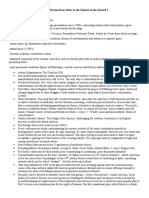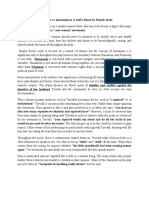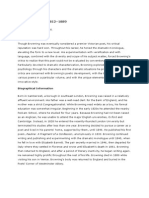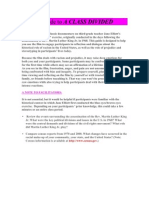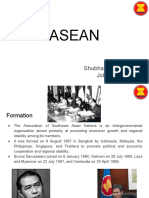The Metamorphosis Existentialism
The Metamorphosis Existentialism
Uploaded by
pelinCopyright:
Available Formats
The Metamorphosis Existentialism
The Metamorphosis Existentialism
Uploaded by
pelinCopyright
Available Formats
Share this document
Did you find this document useful?
Is this content inappropriate?
Copyright:
Available Formats
The Metamorphosis Existentialism
The Metamorphosis Existentialism
Uploaded by
pelinCopyright:
Available Formats
The Metamorphosis Existentialism
Franz Kafka's The Metamorphosis is a masterfully written short story about Gregor Samsa, a man who devotes his life to his family and work, for nothing in return. Only when he is transformed into a helpless beetle does he begin to develop a self-identity and understanding of the relationships around him. The underlying theme of The Metamorphosis is an existential view that says any given choice will govern the later course of a person's life, and that the person has ultimate will overmaking choices. In this case, Gregors lack of identity has caused him to be numb to everything around him.
One morning, Gregor awakens to find himself with the body of a beetle. Although it never explains how Gregor morphed into a beetle, or shows that Gregor gives much thought to having the body of an insect, Kafka gives the strong impression that Gregor is extremely devoted to his work and is the sole support for his family, none of whom work themselves. Gregor devoted himself to a life of work and self sacrifice, following every order and expectation to a scurrilous degree. He life could be likened to that of a drone in an ant colony, and thus gives explanation to Kafkas logic when he transformed Gregor into an insect. Trough his insect transformation, Gregor abandoned his mislead obligation to society and instead devoted the rest of his life to himself. Because of this, Gregors family quickly grew to resent him as a burden to the household. Society and his family had no further use for him, so Gregor starved to death is his bedroom. On an opposite note, Gregors father began the story as a lazy and non-productive human being. He relied solely and completely on his son. After Gregors transformation, his father followed suit. He became a proud and productive individual of the lower bureaucracy. He found the balance between work and leisure that Gregor could not.
According to Kafka and existentialism, people have both an individual side and a side with the commitment of society. It is our choices that must be in moderation of the two, to maintain balance. If a person chooses himself over society, he will loose the support of society; however, if a person chooses society, he will lose his individuality. Gregor initially chooses society over himself, which in turn transformed him into the working drone he was. After his physical transformation, he is forced reassert his focus to himself, and society abandons him. Through Gregors plight, his family became cohesive and productive in society, each contributing through work and leisure. Gregor learned to live for himself too late to become a whole person. Gregor begins to look for entertainment and fun in the form of a bug, a form that knows nothing but work. By ignoring the purpose of being an insect, Gregor defeats the purpose of living in his new form of life, and in effect, dies.
The Metamorphosis advances the existential view that choice is the opportune of the individual. It is the responsibility of the individual to maintain a balance between work and leisure. The Metamorphosis lends the idea that, if one chooses to devote their life entirely to work, they are no more than droning insects, yet if they devote their lives to leisure, they are no better off. A balance needs to be found. As rational beings, the burden of moderation between value to society and value to self must be assumed by the individual. One must be productive in order to be valuable to society, and one must have leisure in order to be valuable to themselves.
How to Cite this Page
MLA Citation: "Existentialism in Franz Kafka's The Metamorphosis." 123HelpMe.com. 08 Dec 2011 <http://www.123HelpMe.com/view.asp?id=15642>.
You might also like
- Quizzes About Rizal BillDocument8 pagesQuizzes About Rizal BillLeila LibotNo ratings yet
- Q1Document32 pagesQ1Jamshaid KhanNo ratings yet
- 17th Century & 16th Century PoetryDocument2 pages17th Century & 16th Century Poetrypelin83% (6)
- Philosphy Plan Pol SciDocument4 pagesPhilosphy Plan Pol SciJunaidNo ratings yet
- Analysis of Poem Love Song...Document8 pagesAnalysis of Poem Love Song...LinaNo ratings yet
- Absurdity in KafkaDocument3 pagesAbsurdity in Kafkajason100% (1)
- The OutsiderDocument10 pagesThe OutsiderNimraa AbdulhayeeNo ratings yet
- In The Station of MetroDocument4 pagesIn The Station of MetroNoor BakhtNo ratings yet
- Philip Larkin PoetryDocument11 pagesPhilip Larkin Poetryrok mod100% (1)
- Assignment 6 Acres and A ThirdDocument7 pagesAssignment 6 Acres and A ThirdTejaNo ratings yet
- As You Like ItDocument37 pagesAs You Like Itdark nightNo ratings yet
- Spring Offensive Crossref NotesDocument6 pagesSpring Offensive Crossref NotesRAJIB DEBNATHNo ratings yet
- The Love Song of J Alfred Prufrock by TDocument2 pagesThe Love Song of J Alfred Prufrock by Tنغم رعد داخل A صباحيNo ratings yet
- Drama Imp Lines (English Literature)Document2 pagesDrama Imp Lines (English Literature)L'Aurore100% (1)
- The Unknown CitizenDocument4 pagesThe Unknown CitizenNutty BunnyNo ratings yet
- Dehumaniszing of MetamorphosisDocument28 pagesDehumaniszing of MetamorphosisNoor Zaman JappaNo ratings yet
- Church GoingDocument12 pagesChurch GoingM irfan hashmiNo ratings yet
- Galilio CH PDFDocument4 pagesGalilio CH PDFSidra LiaqatNo ratings yet
- After The Last BullitensDocument6 pagesAfter The Last BullitensAhmad Aqeel Sarwar100% (1)
- Rima - Chakrabortywaiting For Gogot2021-05-05title of Waiting For GodotDocument1 pageRima - Chakrabortywaiting For Gogot2021-05-05title of Waiting For GodotJitkar HembramNo ratings yet
- Sokel On Kafkas Metamorphosis - From Marx To MythDocument8 pagesSokel On Kafkas Metamorphosis - From Marx To MythantoinephiNo ratings yet
- THE PROTAGONIST OF LIFE OF GALILEO by Shreeya MalhotraDocument2 pagesTHE PROTAGONIST OF LIFE OF GALILEO by Shreeya MalhotraSHREEYA MALHOTRANo ratings yet
- The HorrorDocument2 pagesThe HorrorSumaira MalikNo ratings yet
- Essay Sonnet 65-RevisedDocument6 pagesEssay Sonnet 65-Revisedapi-350031340100% (1)
- Hero of The NovelDocument3 pagesHero of The NovelSaba HanifNo ratings yet
- Objective CorrelativeDocument1 pageObjective CorrelativemahendratsNo ratings yet
- The African Novel As A Strategy For Decolonization in Ama Ata Aidoo's 'Our Sister Killjoy'Document9 pagesThe African Novel As A Strategy For Decolonization in Ama Ata Aidoo's 'Our Sister Killjoy'EmanNo ratings yet
- An Analysis of Lady Lazarus by Sylvia PlathDocument3 pagesAn Analysis of Lady Lazarus by Sylvia PlathbobnrikiNo ratings yet
- Absurdity in Albert Camus': The OutsiderDocument4 pagesAbsurdity in Albert Camus': The OutsiderTanishq KambojNo ratings yet
- PessimismDocument5 pagesPessimismNadeem ul HassanNo ratings yet
- Portrait of The Artist As A Young Man-1Document22 pagesPortrait of The Artist As A Young Man-1Christie Pegu100% (1)
- Sonnet 138 Analysis-3Document2 pagesSonnet 138 Analysis-3api-405575421No ratings yet
- Marx's Capital and Kafka's The MetamorphosisDocument3 pagesMarx's Capital and Kafka's The MetamorphosisEric RilezNo ratings yet
- Bertolt Brecht Was A Dramatist Who Changed Meanings of TragedyDocument5 pagesBertolt Brecht Was A Dramatist Who Changed Meanings of TragedyRidaNo ratings yet
- Because I Could Not Stop For Death ThemeDocument1 pageBecause I Could Not Stop For Death ThemeGreen LightNo ratings yet
- Finail 2Document7 pagesFinail 2api-470008660No ratings yet
- Larkin Ambulances1Document4 pagesLarkin Ambulances1Sumaira MalikNo ratings yet
- English Literature Essays - Proviso Scene of - The Way of The WorldDocument2 pagesEnglish Literature Essays - Proviso Scene of - The Way of The WorldZeeshan LiquatNo ratings yet
- Epic & Tragedy-1Document2 pagesEpic & Tragedy-1Arif NawazNo ratings yet
- Modern Drama From Shaw To The Theatre of The Absurd IDocument12 pagesModern Drama From Shaw To The Theatre of The Absurd IAttila ZsohárNo ratings yet
- Keats and ImaginationDocument5 pagesKeats and Imaginationapi-3703506No ratings yet
- Henrik IbsenDocument3 pagesHenrik IbsenNimra SafdarNo ratings yet
- Hawk RoostingDocument1 pageHawk RoostingSourabh AgarwalNo ratings yet
- Room of One's Own and CustodyDocument10 pagesRoom of One's Own and CustodyDushyant NimavatNo ratings yet
- Stylistics Analysis of The Poem "Ambulance" by Philip LarkinDocument4 pagesStylistics Analysis of The Poem "Ambulance" by Philip LarkinAngel AemxNo ratings yet
- Life and Times of John MiltonDocument28 pagesLife and Times of John MiltonRohanChoudharyNo ratings yet
- Group 1 (Hedda Gabbler)Document14 pagesGroup 1 (Hedda Gabbler)Arslan ChNo ratings yet
- The Journey Within The Heart of Darkness 11presentation TranscriptDocument2 pagesThe Journey Within The Heart of Darkness 11presentation TranscriptNisar SharfiNo ratings yet
- Death of A Salesman by Arthur MillerDocument7 pagesDeath of A Salesman by Arthur MillerJanisNo ratings yet
- Character Analysis Heart of DarknessDocument4 pagesCharacter Analysis Heart of DarknessWahid ShantoNo ratings yet
- Ezra PoundDocument7 pagesEzra PoundAbul Hasanat SekhNo ratings yet
- KeatsDocument15 pagesKeatsChristy Anne100% (1)
- The Unknown Citizen AssignmentDocument3 pagesThe Unknown Citizen AssignmentRawezh NorieyNo ratings yet
- 39 141 1 PB PDFDocument7 pages39 141 1 PB PDFRavindra KumarNo ratings yet
- Emily Dickinson's Collected Poems Summary and Analysis of "Because I Could Not Stop For Death - "Document2 pagesEmily Dickinson's Collected Poems Summary and Analysis of "Because I Could Not Stop For Death - "KrisshaNo ratings yet
- The Improvisation of Power by Stephen GreenblattDocument2 pagesThe Improvisation of Power by Stephen Greenblattrafah rafeekNo ratings yet
- The Pot of GoldDocument15 pagesThe Pot of GoldKrishna MukherjeeNo ratings yet
- SENSUOUS AND SCHOLARLY READING IN KEATS'S ON FIRST LOOKING INTO CHAPMAN'S HOMER' / Thomas DayDocument8 pagesSENSUOUS AND SCHOLARLY READING IN KEATS'S ON FIRST LOOKING INTO CHAPMAN'S HOMER' / Thomas DayraimondisergioNo ratings yet
- Major Themes in "A Portrait of The Artist As A Young Man"Document1 pageMajor Themes in "A Portrait of The Artist As A Young Man"Sizzling Snow50% (2)
- David Herbert Lawrence Sons and LoversDocument8 pagesDavid Herbert Lawrence Sons and LoversFülöpné Milák ZsuzsaNo ratings yet
- Endgame Study and Reflection. Theme 8 AbsurdDocument2 pagesEndgame Study and Reflection. Theme 8 AbsurdJavo Silva Gil NavarroNo ratings yet
- Theatre of AbsurdDocument4 pagesTheatre of AbsurdpelinNo ratings yet
- Terror and Ambivalence of The Human Soul in The Emperor Jones and The Hairy ApeDocument10 pagesTerror and Ambivalence of The Human Soul in The Emperor Jones and The Hairy ApepelinNo ratings yet
- The Drama and Theatre of Wole SoyinkaDocument14 pagesThe Drama and Theatre of Wole Soyinkapelin100% (4)
- The Turn of The Screw Themes and MessagesDocument12 pagesThe Turn of The Screw Themes and MessagespelinNo ratings yet
- Existentialism and PsychologyDocument10 pagesExistentialism and PsychologypelinNo ratings yet
- The Influence of Existentialism On The Theatre of The AbsurdDocument4 pagesThe Influence of Existentialism On The Theatre of The Absurdpelin67% (3)
- Sherlock Holmes Vs PostmodernismDocument15 pagesSherlock Holmes Vs Postmodernismpelin100% (1)
- Robert Browning PoetryDocument4 pagesRobert Browning PoetrypelinNo ratings yet
- Animal Riddles Game EasyDocument3 pagesAnimal Riddles Game EasypelinNo ratings yet
- This Study Resource WasDocument3 pagesThis Study Resource Wasjaja riveraNo ratings yet
- 1.3.3 Black TemplarsDocument6 pages1.3.3 Black TemplarsFacundo RodriguezNo ratings yet
- Facilitator Guide A Class DividedDocument8 pagesFacilitator Guide A Class Dividedbmorris777No ratings yet
- Asean & OpecDocument20 pagesAsean & OpeckjohnabrahamNo ratings yet
- The Cold War, - Walter Lippman, 1947Document5 pagesThe Cold War, - Walter Lippman, 1947Mir TalibNo ratings yet
- C40 (2019) Inclusive Community Engagement PlaybookDocument136 pagesC40 (2019) Inclusive Community Engagement PlaybookAthouba SagolsemNo ratings yet
- Oluwaseun Completed PropagandaDocument5 pagesOluwaseun Completed PropagandaAdekayero MichaelNo ratings yet
- Rivers of India PDFDocument1 pageRivers of India PDFV A Prem Kumar100% (1)
- January 28Document48 pagesJanuary 28fijitimescanadaNo ratings yet
- G.R. No. 177056 September 18, 2009Document2 pagesG.R. No. 177056 September 18, 2009Al Cheeno O. AñonuevoNo ratings yet
- Vision Prelims 2024 Test 1 Q - EDocument20 pagesVision Prelims 2024 Test 1 Q - EBallarapu PramodNo ratings yet
- My Cousin's Enemy Is My Friend: A Study of Pashtun "Tribes"Document27 pagesMy Cousin's Enemy Is My Friend: A Study of Pashtun "Tribes"monocle100% (9)
- Philippine Government OfficialsDocument4 pagesPhilippine Government OfficialsPteridopyte LaurioNo ratings yet
- Student Protest in The 1960sDocument17 pagesStudent Protest in The 1960sJulianna Borbely100% (1)
- Department Order No. 40 B 03 Series of 2003 February 16 2004Document2 pagesDepartment Order No. 40 B 03 Series of 2003 February 16 2004nido12No ratings yet
- Wilkie Collins, The Woman in WhiteDocument6 pagesWilkie Collins, The Woman in WhiteAnik KarmakarNo ratings yet
- Eo Establishment of (Vawc) Desk and Designating Vaw Desk Officer in The BarangayDocument2 pagesEo Establishment of (Vawc) Desk and Designating Vaw Desk Officer in The BarangayBarangay GuerreroNo ratings yet
- 0021 Voters - List. Bay, Laguna - Brgy Bitin - Precint.0140aDocument5 pages0021 Voters - List. Bay, Laguna - Brgy Bitin - Precint.0140aIwai MotoNo ratings yet
- Essay On The Food Security in IndiaDocument8 pagesEssay On The Food Security in IndiaDojo DavisNo ratings yet
- PM Starts Swachh Bharat Ph-2: CM Tells Officials To Get Dam DuesDocument10 pagesPM Starts Swachh Bharat Ph-2: CM Tells Officials To Get Dam DuesDeepthi ChendhuluruNo ratings yet
- Cooperative GovernanceDocument24 pagesCooperative GovernanceParamjit Sharma88% (8)
- Womens Participation in Panchayat Raj inDocument11 pagesWomens Participation in Panchayat Raj inShivaraj ItagiNo ratings yet
- Guyana-Venezuela AbritrationDocument6 pagesGuyana-Venezuela AbritrationTeon Costa CogginsNo ratings yet
- #2 - Republic V SandiganbayanDocument4 pages#2 - Republic V SandiganbayanRealKD30No ratings yet
- Group 6 - Religion and ConflictDocument21 pagesGroup 6 - Religion and Conflictrockey kcNo ratings yet
- National E/m Government Strategies A Case of IndiaDocument20 pagesNational E/m Government Strategies A Case of IndiaAtheer AlnaqeebNo ratings yet
- 5 Land Use Planning Part IDocument13 pages5 Land Use Planning Part IPhryniaImogenNo ratings yet
- B Human Rights D Civic RightsDocument56 pagesB Human Rights D Civic RightsfiroNo ratings yet







































